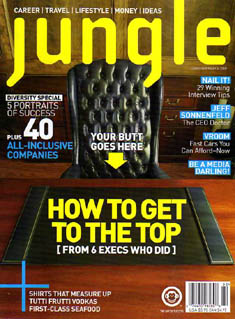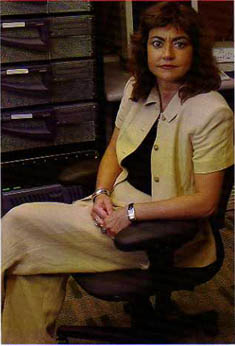Jungle Magazine
March 15, 2007
|
|
Magazine Cover
Soraya Bittencourt
|
|
|
Minority Report "Last year wasn’t the finest moment for diversity in some quarters of America. Mel had his Jewish Problem, Rosie her “ching, chong” crisis, and Michael “Kramer” Richards’ tirade—well, who woulda thunk it? Corporate America, though, seemed to behave itself, with minority groups continuing to encounter fewer bumps on their career paths than did their parents and grandparents. Still, change is never entirely smooth; in some settings, resistance to diversity is too deeply entrenched to be easily routed. Everybody in business has an individual story to tell, but the stories of the people who are bringing diversity to the workplace are inevitably shaped by ethnic, cultural, and even sexual identity. Jungle talked to five successful people, and asked them how their minority status has influenced their careers. Software Hardball: Soraya Bittencourt Soraya Bittencourt is in business for herself now. The Brazilian-born software designer is the founder of Nutrihand, Inc., a company that delivers Internet-based nutritional services. But she hasn’t always run her own shop, having logged time at Lotus, AOL, and a little Seattle–based outfit known as Microsoft. In the early 1990s, as the owner of a Kinko’s-type store, Bittencourt had devised a series of travel-related multimedia CD-ROMs but had never figured out a way to make them pay. But when she landed at Microsoft in 1993, she wanted to make sure her innovation got the attention it deserved. “I stalked Bill Gates,” she admits. “Eventually he decided to push it forward.” Good thinking— Bittencourt’s travel software served as the core of Expedia. She stayed with the company for six years, until Expedia was up and running. She left Microsoft in 1998 to join the executive management team at Obongo, a California e-commerce outfit (subsequently bought by AOL.) “I couldn’t stand the rain in Seattle,” she says—but it was in fact more complicated than that. An out lesbian, Bittencourt was an active member of GLEAM (Gay and Lesbian Employees at Microsoft), the company’s gay/lesbian employee resource group. But as she relates in her autobiography, My Road to Microsoft: One Women’s Success Story, she was passed over for a key promotion, and eventually ended up working for a manager who made it clear that he had little use for her and her sexuality. Bittencourt’s was now one of the company’s highest-level gay and lesbian employees. “When you’re an entry-level engineer, it’s probably not an issue,” she says. “But when you’re at a high level, everything you do reflects on the company.” The difficulty had nothing to do with Microsoft’s official policies. But an employee handbook can’t magically erase longstanding prejudices. “Everybody at Microsoft is extremely smart: They will never do it in a way that could be reported,” says Bittencourt. “But though they teach managers how to accept diversity, the reality is that the manager won’t always comply.” She waited until she became vested, then handed in her notice. She acknowledges that attitudes may have changed in the years since. For her own part, she’s proud of her new project: Bittencourt is a diabetic, and Nutrihand addresses issues that she deals with every day. She emerged from Microsoft a millionaire, but she can’t help but speculate on what might have happened if she’d simply swallowed her pride. “If I weren’t so involved, I could have stayed there—and I would have made $50 million,” she says. “But since I took it extremely personally, I didn’t have the chance.” |


